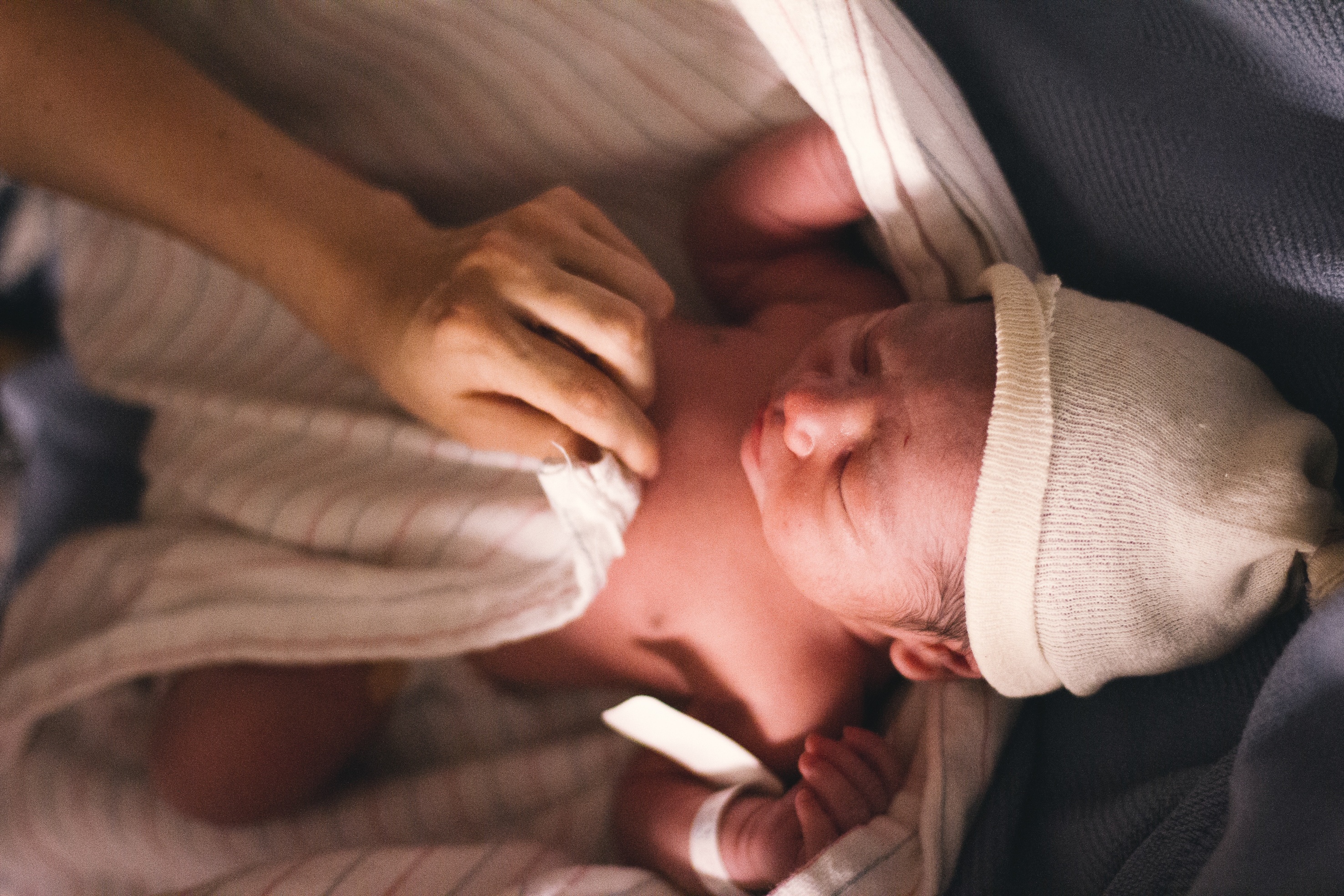Ongoing Studies
The STEP Study
We are conducting an observational study to examine how daily stress impacts cardiovascular functioning, sleep, mental health, and physical health in young adults. This study will also explore key risk and protective factors that may influence these relationships. The study will occur in two parts. First, University of Iowa undergraduates aged 18–19 years will complete an online survey assessing stress and health. The second portion focuses on first-generation college students specifically. We will measure psychiatric symptoms using a structured interview, heart rate variability during an in-lab stress task, daily surveys measuring sleep and stress, and activity and cardiovascular data from Garmin VivoActive 5 watches to examine how stress, psychiatric symptoms, sleep, physical activity, and cardiovascular health are related.


HAPPY Brain Study
We are recruiting currently pregnant women in their first trimester (14 weeks or less) for an observational longitudinal study to examine the patterns of mood-related symptoms across pregnancy and after delivery. We are collaborating with several other investigators at the University to learn more about psychiatric symptoms, the brain, and perinatal and postpartum functioning in the parent and child. To learn more or to participate, please visit our study's website.
Pre-registration: https://osf.io/4sy95/?view_only=a2b174354ad9489ea7881225b3441a23
ACT for CABG
The ACT for CABG Study was developed to support individuals undergoing cardiac artery bypass graft (CABG). We will be primarily investigating the feasibility of a brief pre-operative psychotherapy intervention. We will also assess if the intervention impacts psychosocial factors such as well-being, quality of life, and symptoms of anxiety and depression. Additionally, we will examine if the intervention impacts inflammation. This study is a collaborative effort by researchers in Psychological and Brain Sciences and Cardiothoracic Surgery. This study is under review by the IRB and not yet recruiting.
ClinicalTrials.gov Registration: NCT06207318

Completed Studies
Data collection for these studies has concluded, and we have moved toward publishing the findings. When permitted, we will include links to open-access publications.
Maternal Childhood Maltreatment and Infant Birth Outcomes
In collaboration with Kelli Ryckman and The Neonatal and Pediatric Biorepository, we will examine the impact of maternal childhood maltreatment and on infant birth and early-life outcomes. We will also explore the validity of a brief trauma screening instrument as compared to gold-standard trauma measures.

Effects of Traumatic Experiences on Flexibility and Internalizing Symptoms
This study examines the relation between trauma exposure and psychological distress and maladaptive behaviors (i.e. tobacco use, alcohol use, disorder eating). Further, this study will examine if avoidance may act as an explanatory component in these relations. Understanding these relations may allow for the development of targeted interventions for those who have experienced trauma.
A manuscript using data from this study was published in Current Psychology. See link below for publication.
College student mental health: Understanding changes in psychological symptoms in the context of the COVID-19 pandemic in the United States. https://link.springer.com/article/10.1007/s12144-022-03193-w

Graduate and Professional Student Health and Coping Study
We are conducting a cross-sectional study to identify the health, psychosocial, and demographic factors that may serve as potential targets for future interventions for graduate and professional students. The study involves a brief anonymous survey.
The study procedures and hypotheses are pre-registered: https://osf.io/7zrpy/?view_only=f3edbe71c9fc4145afce1ab073f8c654
Continuing Validation of the CompACT-15
Following our work on the Comprehensive Assessment of Acceptance and Commitment Therapy-15 (CompACT-15; Hsu, Hoffman & Thomas, 2023; Psychological Assessment), we are conducting a study to further refine the instrument by applying the Expanded response format (Zhang & Savalei, 2016), which resolves psychometric issues introduced by the original Likert response format. We will recruit an online sample via Prolific. This study has received funding in the form of the 2024 Society for Multivariate Experimental Psychology (SMEP) Dissertation Research Grant, and the 2022 University of Iowa Erling Anderson Award for Excellence in Clinical Science.
OSF Pre-Registration: https://osf.io/kcwxt/
MomMoodBooster Perinatal Trial
MomMoodBooster is an online empirically validated intervention developed by Brian Danaher and Milagra Tyler for postpartum depressive symptoms. The current trial is an expansion of a nationwide service delivery project that has been ongoing for seven years with the goal of offering the intervention to postpartum Veterans nationwide, and this effort was led by Dr. Michael O'Hara, Ph.D. We have expanded the sample to include both pregnant and postpartum Veterans. The MomMoodBooster intervention contains six online cognitive-behavioral modules that are to be completed over six weeks, and it includes identification of pleasant activities, tracking mood and thoughts, and identification of goals. The intervention is accessible on browsers via computer, tablet, or mobile phone.
Within the current trial, Veterans complete the online modules of the intervention, and Veterans receive calls from a phone coach to monitor symptoms or individualize the intervention content. In addition, two optional booster modules and associated calls continue application of the skills beyond the six-week intervention period. The present study seeks to investigate the incremental utility of the phone coaching component of the intervention by randomizing pregnant and postpartum Veterans to the MomMoodBooster intervention or the MomMoodBooster intervention plus phone coaching. Primary outcomes will include depressive symptoms, behavioral activation, and negative automatic thoughts.
We have concluded recruitment for this trial.
CT.gov Trial Number: NCT05196152


ACT with Perinatal Women
This randomized trial will examine the effectiveness of an ACT intervention in the second trimester of pregnancy, as compared to an enhanced treatment-as-usual condition. The study will examine change in mood and anxiety symptoms, targeted therapeutic processes, and infant birth outcomes. The study will also examine the moderating role of maternal childhood trauma.
We have concluded recruitment and data collection for this study.
CT.gov Trial Number: NCT03837392

Trauma, Alexithymia, and Somatic Symptoms
This study will evaluate the mediating role of alexithymia in the association between childhood trauma and somatic symptoms among young adults (aged 18-26). Of additional interest are the interrelations among key ACT processes (e.g., mindfulness, acceptance, values-based action) and alexithymia. Findings of the study may help to identify key processes that are modifiable through psychotherapeutic intervention to design targeted interventions for individuals exposed to childhood trauma.
The data for this study have been collected, and we are in the process of analyzing the data for publication.
One manuscript from this study was recently published in Psychological Trauma: Theory, Research, Practice, and Policy. See link below.
Childhood maltreatment and somatic symptoms: Examining the role of specific types of childhood maltreatment and alexithymia. https://psycnet.apa.org/record/2022-80207-001
Another study was published in Psychology, Health, & Medicine, comparing psychological flexibility (openness, awareness, engagement), physical health, mental health, and general distress in undergraduate students with and without a self-reported functional somatic syndrome. Findings showed that students with a functional somatic syndrome have lower behavioral awareness and more impaired physical health. The article is available online.
https://www.tandfonline.com/doi/full/10.1080/13548506.2023.2216940

Trauma and Approach-Avoidance Behavior
Experiential avoidance is conceptualized as any attempt to suppress or get rid of unwanted internal experiences (e.g., thoughts, emotions, memories). Trauma-exposed individuals are known to have an increased propensity for experiential avoidance. In considering individual responses to unwanted internal experiences, a trauma-exposed individual may choose to avoid an unpleasant stimulus, even when approaching that stimulus would be important for the task at hand. Researchers at the University of Wisconsin-Madison recently validated a trauma-related approach-avoidance (trAAC) behavior task to explore this relation. This task presents participants with the goal of accruing the maximal number of points over the course of many trials. Throughout the task, the participants face approach-avoidance conflict phases with varying probabilities of negative stimuli and reward. This study, in collaboration with Shelby Weaver from the University of Wisconsin-Madison, examines task performance among participants across a range of trauma exposures and symptom levels, exploring whether trauma exposure or PTSD symptoms drive differential responding.
OSF Registration: https://osf.io/9kdy7/?view_only=e4914b878fad4841b8b712f75d279913
Coping with COVID-19
The coronavirus (COVID-19) pandemic has continued to cause significant disruptions and challenges in the lives of individuals, families, and communities worldwide. This study explores how adversity related to COVID-19 are related to psychological symptoms and resilience longitudinally. Further, we are interested in how people's perceptions of stress influence this relation, along with demographic characteristics, trauma history, and coping strategies. We will collect monthly self-report questionnaires via MTurk to investigate predictors of psychological risk and resilience longitudinally. Furthermore, data from this study are being used to validate a self-report measure of pandemic-related adversity.
Recruitment and data collection have concluded, and data analyses are underway. Several manuscripts have been published using these data. See links below for publications.
Psychological flexibility in the context of COVID-19 adversity: Associations with distress. https://www.sciencedirect.com/science/article/pii/S2212144720301666
Face Covered and Six Feet Apart: Behavioral Awareness Predicts Greater Adherence to Public Health Guidelines during the COVID-19 Pandemic. https://www.mdpi.com/1660-4601/18/16/8247


Educators Project
This study will evaluate how the COVID-19 pandemic, particularly the reopening of schools, has affected educators throughout the United States with respect to educator burnout, as well as mood and anxiety symptoms. Of additional interest are how different school district plans for in-person, remote, or hybrid learning affect demographic characteristics and attitudes towards COVID-19 and, subsequently, affect educator burnout, as well as mood and anxiety symptoms.
Data collection has concluded, and data analyses are underway.
Publication:
Carlson AS, Stegall MS, Sirotiak Z, Herrmann F, Thomas EBK. Just as essential: The mental health of educators during the COVID-19 pandemic. Disaster Med Public Health Prep. 18(e6), 1–10. doi: https://doi.org/10.1017/dmp.2023.231.